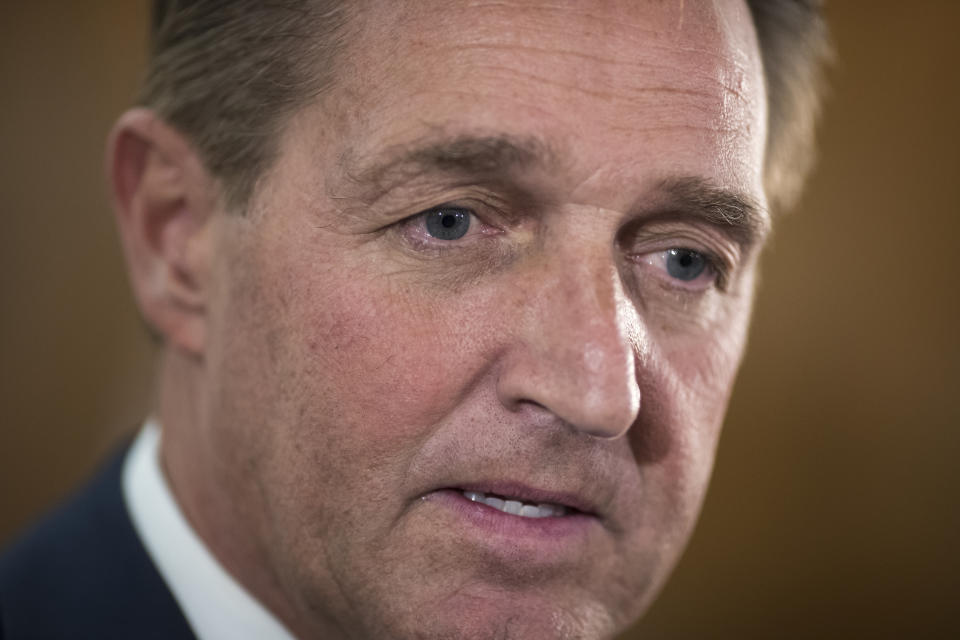In farewell speeches, senators bemoan downfall of the 'world's greatest deliberative body'

To hear some outgoing senators tell it, the body they are leaving no longer deserves to be called “the world’s greatest deliberative body.”
“The United States Senate is no longer the world’s greatest deliberative body, and everybody needs to quit saying it until we recover from this period of polarization and the fear of the political consequences of tough votes,” Sen. Claire McCaskill, D-Mo., said Thursday in a speech on the Senate floor. She was defeated in her bid for a third term by Republican Josh Hawley, in a midterm election in which Democrats lost a net of two Senate seats.
But even some Republicans echoed her assessment, including retiring Sen. Orrin Hatch of Utah, whose valedictory declared that “the Senate, as an institution, is in crisis.”
“Things weren’t always as they are now,” Hatch, who served 41 years in the Senate, said. “I was here when this body was at its best. I was here when the regular order was the norm, when legislation was debated in committee and when members worked constructively with one another for the good of the country. I was here when we could say without any hint of irony that we were members of the world’s greatest deliberative body.”
McCaskill and Hatch didn’t specify which other body they believe has surpassed the Senate in deliberative stature.

Sen. Jeff Flake, a frequent critic of Donald Trump who opted to retire rather than face a primary challenge from a more conservative Republican, echoed the sentiment that partisan polarization had crippled the Senate.
“To say that our politics is not healthy is somewhat of an understatement,” said Flake, who served in the House of Representatives for 12 years before his election to the Senate in 2012. “I believe that we all know well that this is not a normal time and that the threats to our democracy from within and without are real and none of us can say with confidence how the situation that we now find ourselves in will turn out.”
McCaskill likened the decline of measured discourse in the Senate to the rancor found at dysfunctional family gatherings.
“I’d be lying if I didn’t say I was worried about this place. It just doesn’t work as well as it used to. The Senate has been so enjoyable for me, but I must admit it puts the ‘fun’ in ‘dysfunction,’” McCaskill said, adding, “Peter Morgan, an author, said that no family is complete without an embarrassing uncle. We have too many embarrassing uncles in the United States Senate.”
Joe Donnelly, D-Ind., a one-term senator who was defeated in the midterms by Republican Mike Braun, boasted about his across-the-aisle cooperation with Republicans Susan Collins and John McCain, but took aim at the hyperpartisan atmosphere that has taken root in recent years.
“Partisanship gets us nothing. Division gets us nothing. You know I was thinking about the best way to explain this, and it’s this: When a fire department goes to a house, they don’t ask if the person living there is Democrat or Republican, they’re just there to help their neighbor.”
While Hatch called on those who remain in the Senate to heed their “better angels” and strive for “comity” and Flake took comfort in knowing that the current “condition of our civic life” could prove to be only temporary, McCaskill made it clear that she wished she could still be a part of the solution.
“You are family, and I will miss you terribly,” she said.
_____
Read more from Yahoo News:
Cohen is a ‘serial liar,’ says former Trump aide Lewandowski
Take a number: Migrants, blocked at the border, wait their turn to apply for asylum
An American killing: Why did the U.S. Park Police fatally shoot Bijan Ghaisar?
I called George Bush a ‘wimp’ on the cover of Newsweek. Why I was wrong.
Photos: Manhunt for Strasbourg, France, Christmas market attack suspect



